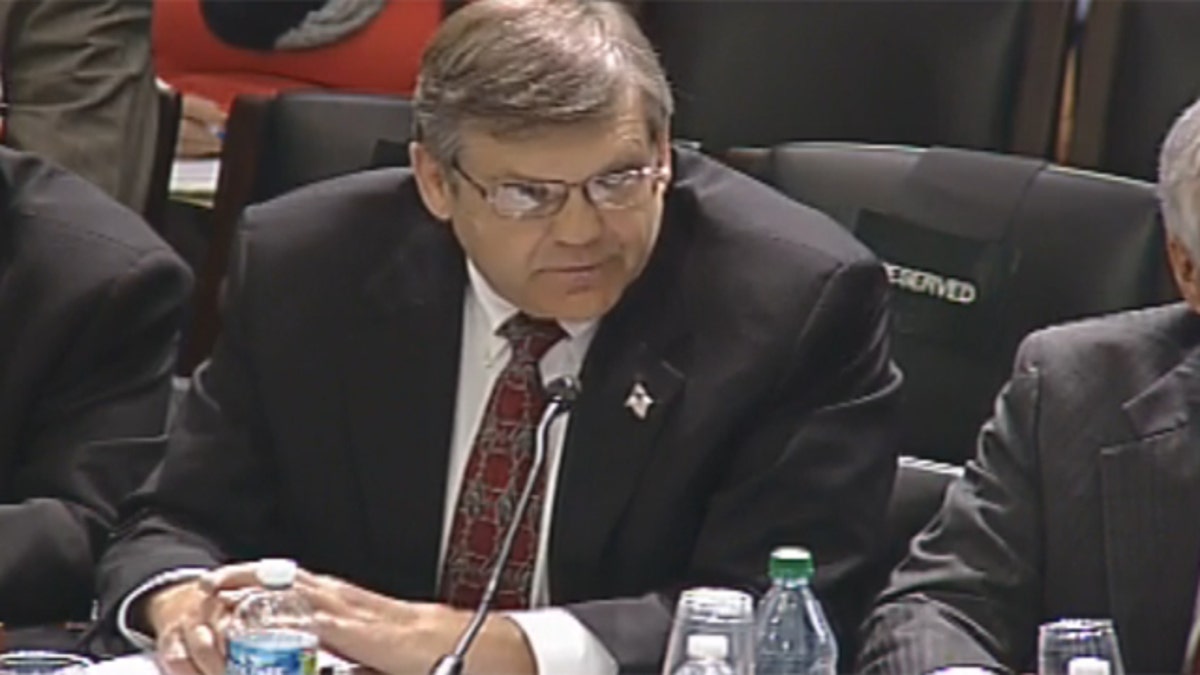
Nov. 18, 2011: Consultant Steve Gardner testifies before a House Natural Resources Committee subcommittee on Capitol Hill. (House Natural Resources Committee)
The Obama administration pressured analysts to change an environmental review to reflect fewer job losses from a proposed regulation, the contractors who worked on the review testified Friday.
The dispute revolves around proposed changes to a rule regulating coal mining near streams and other waterways. The experts contracted to analyze the impact of the rule initially found that it would cost 7,000 coal jobs.
But the contractors claim they were subsequently pressured to not only keep the findings under wraps but "revisit" the study in order to show less of an impact on jobs.
Steve Gardner, president of Kentucky consulting firm ECSI, claimed that after the project team refused to "soften" the numbers, the firms working on the study were told the contract would not be renewed. ECSI was a subcontractor on the project.
The government "'suggested' that the ... members revisit the production impacts and associated job loss numbers, with different assumptions that obviously would then lead to a lesser impact," Gardner testified before a House Natural Resources subcommittee. "The ... team unanimously refused to use a 'fabricated' baseline scenario to soften the production loss numbers."
The Obama administration, without going into specifics, contested Gardner's claims after the hearing.
The charges escalate a dispute over environmental regulations that has been brewing for months, as the Obama administration tries to overhaul mining rules that were put in place at the end of the George W. Bush administration following a years-long review.
"Right now, there's a tremendous amount of smoke. And where there's smoke, there's usually fire," Rep. Bill Johnson, R-Ohio, told FoxNews.com ahead of the hearing Friday.
The prediction that the changes would cost 7,000 jobs was first made public in January of this year. As officials in the affected states cried foul, the Office of Surface Mining Reclamation and Enforcement defended its proposed re-write.
Joseph Pizarchik, director of that office, went further in a hearing earlier this month and said the job-loss stats were "fabricated based on placeholder numbers and have no basis in fact."
He said the numbers were "based on no evidence."
But on Friday, the subcontractors pushed back.
Gardner rejected Pizarchik's claim, and said in written testimony that the office asked the team to re-do its study when it "did not like the result of the analysis."
Johnson said he will "demand accountability" as he looks into what happened during the review.
"We've got potentially a very serious issue here," the congressman said.
Christopher Holmes, spokesman for the Interior Department's surface mining office, said in a written statement Friday afternoon that the office "respectfully disagrees with portions of the testimony."
Holmes said the subcontractor worked on an "early working draft" and said it is "premature and misleading to characterize the work underway before it is properly offered for comment."
Holmes said that once completed, the full analysis "will be available for public scrutiny."
"Because it remains a priority to develop our coal reserves while protecting the health of our waterways and the people that depend on them, OSM is committed to the development of a proposed rule and draft (study), with an anticipated publication date of Spring 2012," he said.
The discrepancy in the numbers centered on what the consultants were comparing the new rule against.
According to Gardner, the Obama administration wanted them to assume the Bush-era 2008 mining regulation was in effect across the country -- though it is not and has been challenged in court. Gardner's firm did not want to do that but noted that using that assumption would show "less job loss impact."
While the mining industry has expressed concern about the economic impact of the regulation overhaul, the administration claims it is trying to address serious environmental issues that were unresolved in the last review.
Pizarchik, in his submitted testimony earlier this month, said the 2008 rule did not "fully" explore mining's impact on aquatic ecosystems. He said the government's goal is to protect drinking water, wildlife and scenery.
As officials debate the impact of proposed national mining regulations, another environmental decision in Ohio could put more jobs at stake. Earlier this week, the U.S. Forest Service withdrew plans to sell drilling rights on a national forest in Ohio so experts could study the impact of a drilling process known as fracking.




